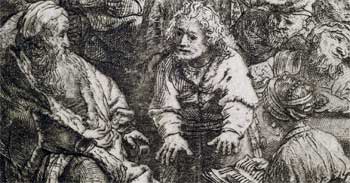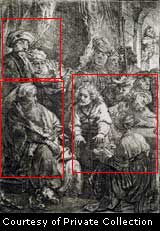
Pit Stop
After Jacob's death, Joseph and his brothers carried out their father's instructions that he be buried with his forefathers in Canaan. On the return trip to Egypt, the brothers were overcome by the fear that now that their father had departed, Joseph would seek just revenge for their having conspired against him and thrown him into the pit. They implored him in the name of their father to spare them:
Before his death your father left this instruction: So shall you say to Joseph, 'Forgive, I urge you, the offense and guilt of your brothers who treated you so harshly.' Therefore, please forgive the offense of the servants of the God of your father. And Joseph was in tears as they spoke to him. (Genesis 50:16-17)
Midrash Tanhuma intensifies the tension in the story by introducing an additional scene:
And Joseph's brothers saw that their father had died. What was it that they saw which caused them fear? On the way back from their father's burial they saw that Joseph went to recite the blessing at the very pit into which they had cast him And he recited the blessing which one is obligated to recite at a place where a miracle happened to him: 'Blessed art Thou who performed a miracle for me at this place'. (Midrash Tanhuma Vayehi 17)
In this account, the brothers see Joseph returning to the scene of their crime, and fear that retribution will not be long in coming. But the Rabbis portray a Joseph who has matured. He no longer sees himself at the center of the universe; instead, he gives thanks to the source of his salvation.
Joseph listens to his brothers' apprehensions, and cries. He is saddened that they still think him motivated by base considerations of vengeance, when he has long ago come to a God-centered view of all that has transpired:
Have no fear! Am I a substitute for God? Besides, although you intended me harm, God intended it for good, so as to bring about the present result–the survival of many people. (50:19-20)
In this cycle of stories, Joseph appears as both dreamer and interpreter of dreams. Ultimately, his dreams serve as the interpretation of reality for his family and the destiny of the people of Israel.
